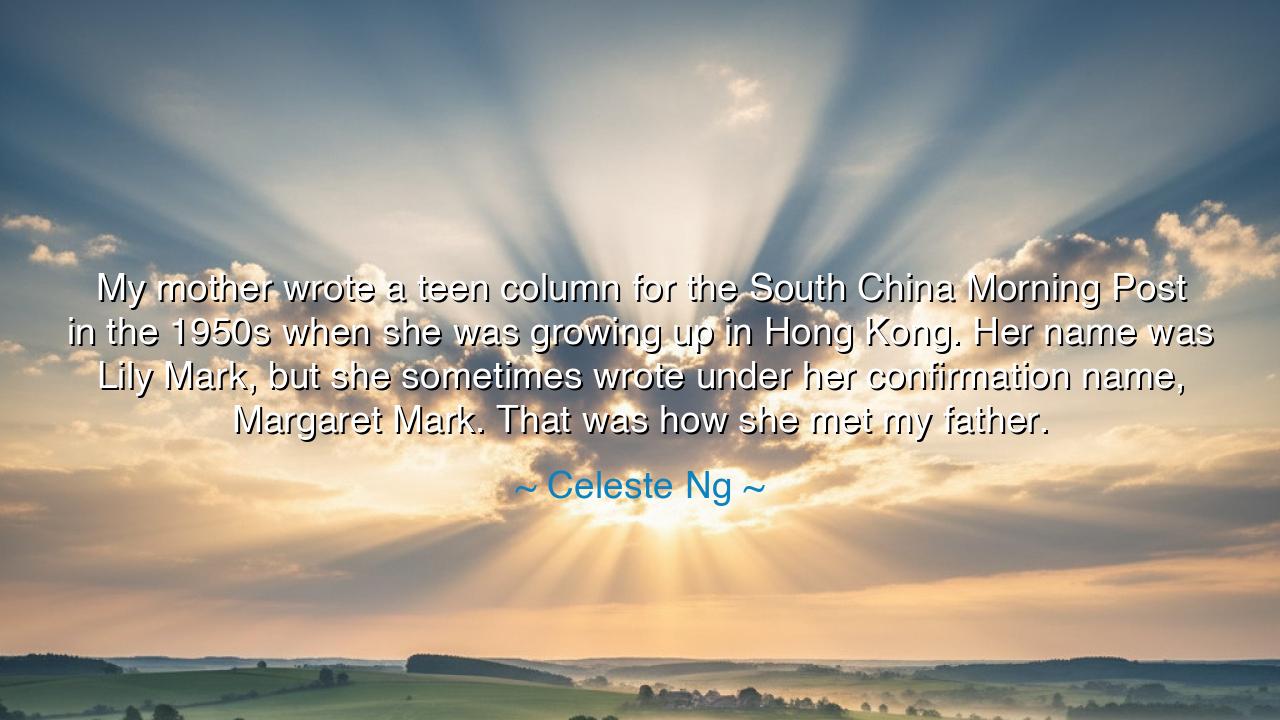
My mother wrote a teen column for the South China Morning Post
My mother wrote a teen column for the South China Morning Post in the 1950s when she was growing up in Hong Kong. Her name was Lily Mark, but she sometimes wrote under her confirmation name, Margaret Mark. That was how she met my father.






“My mother wrote a teen column for the South China Morning Post in the 1950s when she was growing up in Hong Kong. Her name was Lily Mark, but she sometimes wrote under her confirmation name, Margaret Mark. That was how she met my father.” Thus spoke Celeste Ng, novelist of memory and identity, weaving into a simple recollection the timeless truth that words themselves can shape destinies. In this story of columns, pen names, and a chance meeting, we see how the smallest acts of expression—an article, a signature, a thought shared—can ripple outward to alter the course of lives, even to create new generations. What begins as ink on paper becomes the foundation of family, history, and love.
The origin of this saying lies in Ng’s own family history. Her mother, a young girl in Hong Kong, took up the pen to write for others, lending her voice to the pages of a great newspaper. In those days, journalism was not merely a profession but a lifeline of ideas, a way for voices to be carried far beyond their immediate circle. By writing, Lily Mark—or Margaret Mark, as she sometimes called herself—extended her hand into the wider world. And from that world, her future husband found her, guided not by coincidence alone but by the power of the written word.
The ancients, too, knew that the pen and the voice of the writer carried sacred weight. Did not Ovid write that words would outlast marble and bronze, ensuring immortality through poetry? Did not the scribes of Egypt inscribe the names of kings on stone, believing that to write was to preserve the soul itself? Here we see that writing does not only preserve—it connects. It binds hearts across distance, strangers into kin, and, as in the case of Ng’s parents, it can even weave the thread of love. The written word becomes destiny.
History offers us many such examples. Consider the letters of Abelard and Heloise, two souls whose love was kindled and sustained by the exchange of words, even when distance and hardship separated them. Or think of John and Abigail Adams, whose letters during the birth of a nation revealed not only the struggles of politics but the intimacy of a marriage built on shared thought. In each case, writing was more than communication—it was the bridge between hearts, the silent messenger of fate.
From this, we learn that our words matter more than we imagine. A column dashed off by a teenager, a letter written in haste, a name chosen under confirmation—these things may seem small, but they can shape futures. Words are seeds; once cast, we cannot know where they will take root. Lily Mark’s column was more than youthful expression—it was the soil from which her family’s story, and eventually Celeste Ng’s own voice, would grow. So too in our lives: the words we write, speak, or share may touch destinies unseen.
Practical wisdom follows. Do not withhold your voice from the world. Write, speak, share, even when you think it small or insignificant. For the act of expression is never wasted. A word of kindness may heal a heart. A phrase of truth may awaken courage. A name written in print may call forth a stranger who will become family. Honor your voice as a gift, and release it without fear, for you do not know what unseen ripples it will create.
Thus, let Celeste Ng’s memory be a teaching: “That was how she met my father.” Simple words, yet behind them lies a universe of meaning. A column in the 1950s becomes the meeting of two souls, which becomes the birth of a family, which becomes the voice of a writer whose stories reach the world. So too in your life: the smallest act of expression may shape a destiny you cannot yet imagine. Guard your words, cherish them, and set them free—for they are the threads with which fate weaves its tapestry.






AAdministratorAdministrator
Welcome, honored guests. Please leave a comment, we will respond soon